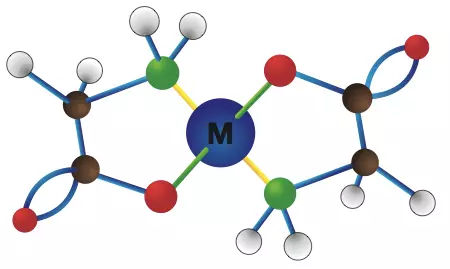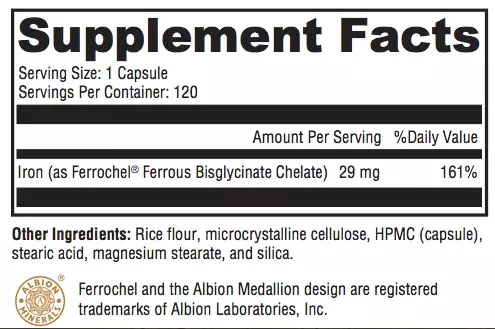June 1, 2024

Patient compliance with iron bis-glycinate appears to be better than that seen with inorganic forms of iron supplements for two reasons. First, the taste: In a study with 145 pregnant women (that concluded daily supplementation with iron bis-glycinate chelate was significantly more effective even at a lower dose than ferrous sulfate) the percentage of taste complaints among the women given ferrous sulfate was 29.8%, while 0% of the women on the bis-glycinate chelate complained about taste. Second, iron bis-glycinate is less likely to have any of the gastrointestinal side-effects associated with standard iron supplementation.*
A published absorption study showed there was a significant correlation between iron absorption of iron bis- glycinate chelate to serum ferritin (r = -0.60, p < 0.03) (The higher the ferritin the lower the absorption and vice versa.) The amount of iron stored in the body regulates iron bis-glycinate chelate absorption. This translates into less chance of toxicity. Another benefit of the bis-glycinate chelate form of iron over other iron supplements is that it doesn’t act as a pro-oxidant.*
Iron is an important component of hemoglobin, myoglobin, and ferritin. These proteins are involved in the transport, storage, and release of oxygen to the tissues.*



Directions:
Take one capsule daily, or as directed by your healthcare practitioner.
Children and pregnant or lactating women should consult their healthcare practitioner prior to use. Do not use if tamper seal is damaged.
References:
1. Pineda O, Ashmead HD. Effectiveness of treatment of iron-deficiency anemia in infants and young children with ferrous bis- glycinate chelate. Nutrition. 2001 May;17(5):381-4. [PMID:11377130]
2. Szarfarc SC, de Cassana LM, Fujimori E, Guerra-Shinohara EM, de Oliveira IM. Relative effectiveness of iron bis-glycinate chelate (Ferrochel) and ferrous sulfate in the control of iron deficiency in pregnant women. Arch Latinoam Nutr. 2001 Mar;51(1 Suppl 1):42-7 [PMID: 1688081]
3. Iron, PDR: http://www.pdrhealth.com/drug_info/nmdrugprofiles/nutsupdrugs/iro_0149.shtml [accessed 11.11.05]
4. Plummer-Vinson Syndrome. http://www.emedicine.com/med/topic3431.htm [Accessed 11.11.05]
5. Hilal Mocan, Alisan Yildiran, Fazil Orhan, Erol Erduran. Breath holding spells in 91 children and response to treatment with iron Arch Dis Child 1999;81:261-262 (September)[http://adc.bmjjournals.com/cgi/content/full/81/3/261] Accessed 11.11.05
6. Brolin RE, Gorman JH, Gorman RC, Petschenik AJ, Bradley LB, Kenler HA, Cody RP. Prophylactic iron supplementation after RouxenY gastric bypass: a prospective, double blind, randomized study. Arch Surg. 1998 Jul;133 (7): 740-4. [PMID 9688002]
7. Kantor J, Kessler LJ, Brooks DG, Cotsarelis G. Decreased serum ferritin is associated with alopecia in women. J Invest Dermatol. 2003 Nov;121(5):985-8 [PMID:14708596]
8. Hershko C, Ronson A, Souroujon M, Maschler Z, Heyd J, Patz J. Variable hematological presentation of autoimmune gastritis:age- related progression from iron deficiency to cobalamin depletion. Blood. 2005 Oct 20; [Epub ahead of print] [PMID:16239424]
9. Ashmead SD. The chemistry of ferrous bis-glycinate chelate. Arch Latinoam Nutr. 2001 Mar; 51(1 Suppl 1):7-12 [PMID: 11688084]
10. Garcia-Casal MN, Layrisse M. The effect of change in pH on the solubility of iron bis-glycinate chelate and other iron compounds. Arch Latinoam Nutr. 2001 Mar;51(1 Suppl 1):35-6. [PMID: 11688079]
11. Szarfarc SC, de Cassana LM, Fujimori E, Guerra-Shinohara EM, de Oliveira IM. Relative effectiveness of iron bis-glycinate chelate (Ferrochel) and ferrous sulfate in the control of iron deficiency in pregnant women. Arch Latinoam Nutr. 2001 Mar;51(1 Suppl 1):42-7 [PMID: 11688081]
12. Olivares M, Pizarro F. Bioavailability of iron bis-glycinate chelate in water. Arch Latinoam Nutr. 2001 Mar;51 (1 Suppl 1): 22-5 [PMID: 11688077]
13. Pineda O, Ashmead HD. Effectiveness of treatment of iron-deficiency anemia in infants and young children with ferrous bis- glycinate chelate. Nutrition. 2001 May;17(5):381-4. [PMID: 11377130]
14. Patterson AJ, Brown WJ, Roberts DC. Dietary and supplement treatment of iron deficiency results in improvements in general health and fatigue in Australian women of childbearing age. J Am Coll Nutr. 2001 Aug;20(4):337-42
15. Pelton R, Lavalle JB, Hawkins EB, et al. Drug Induced Nutrient Depletion Handbook. 2nd ed . Cincinnati, OH: Lexi-Comp Inc; 2001.
